University Project: SIM335 Managing Projects Assessment Report
VerifiedAdded on 2023/01/18
|12
|3815
|39
Report
AI Summary
This report provides a comprehensive overview of project management principles and practices. It begins by exploring the characteristics of a project, the phases of the Project Life Cycle (PLC), and the intent and documented items within a Project Initiation Document (PID). The report then delves int...
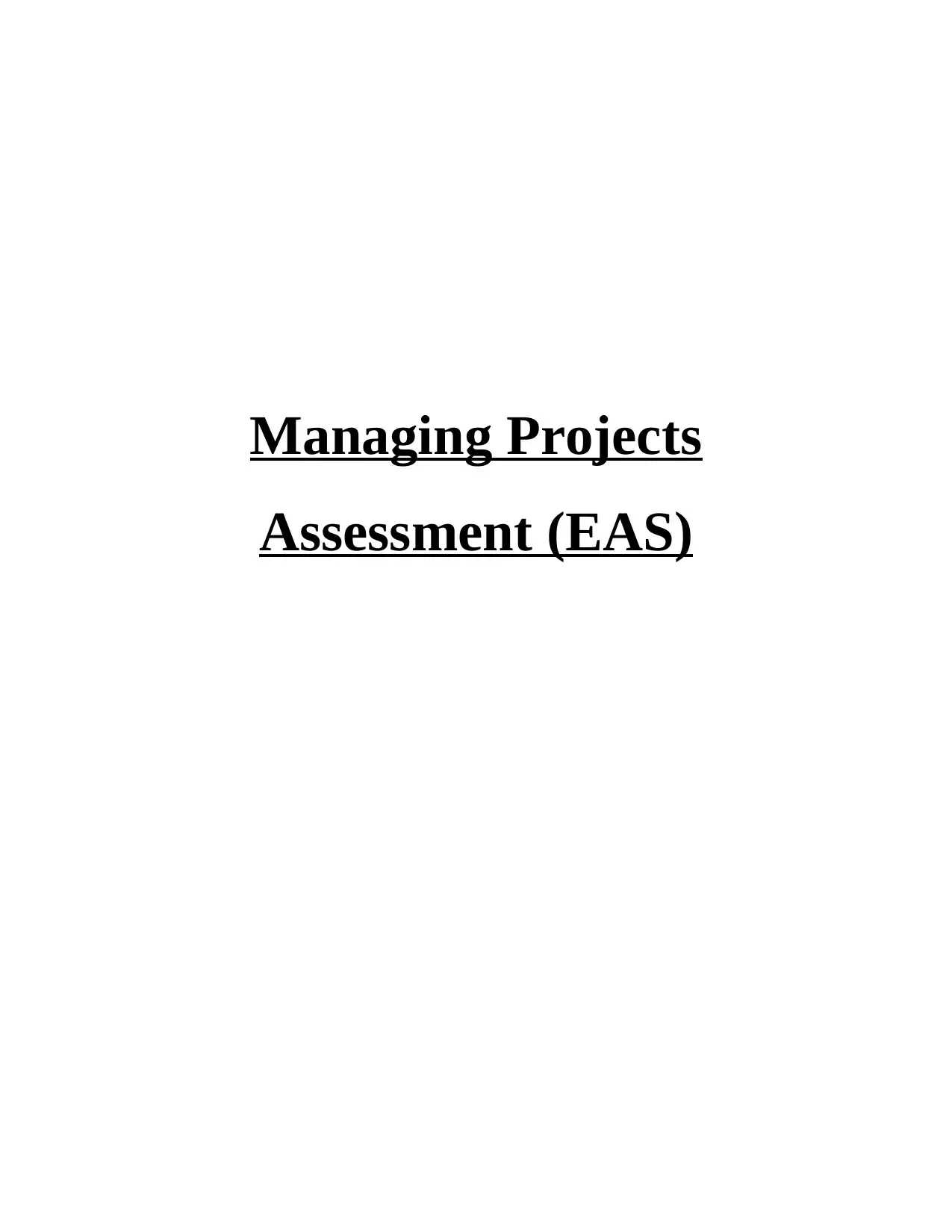
Managing Projects
Assessment (EAS)
Assessment (EAS)
Paraphrase This Document
Need a fresh take? Get an instant paraphrase of this document with our AI Paraphraser
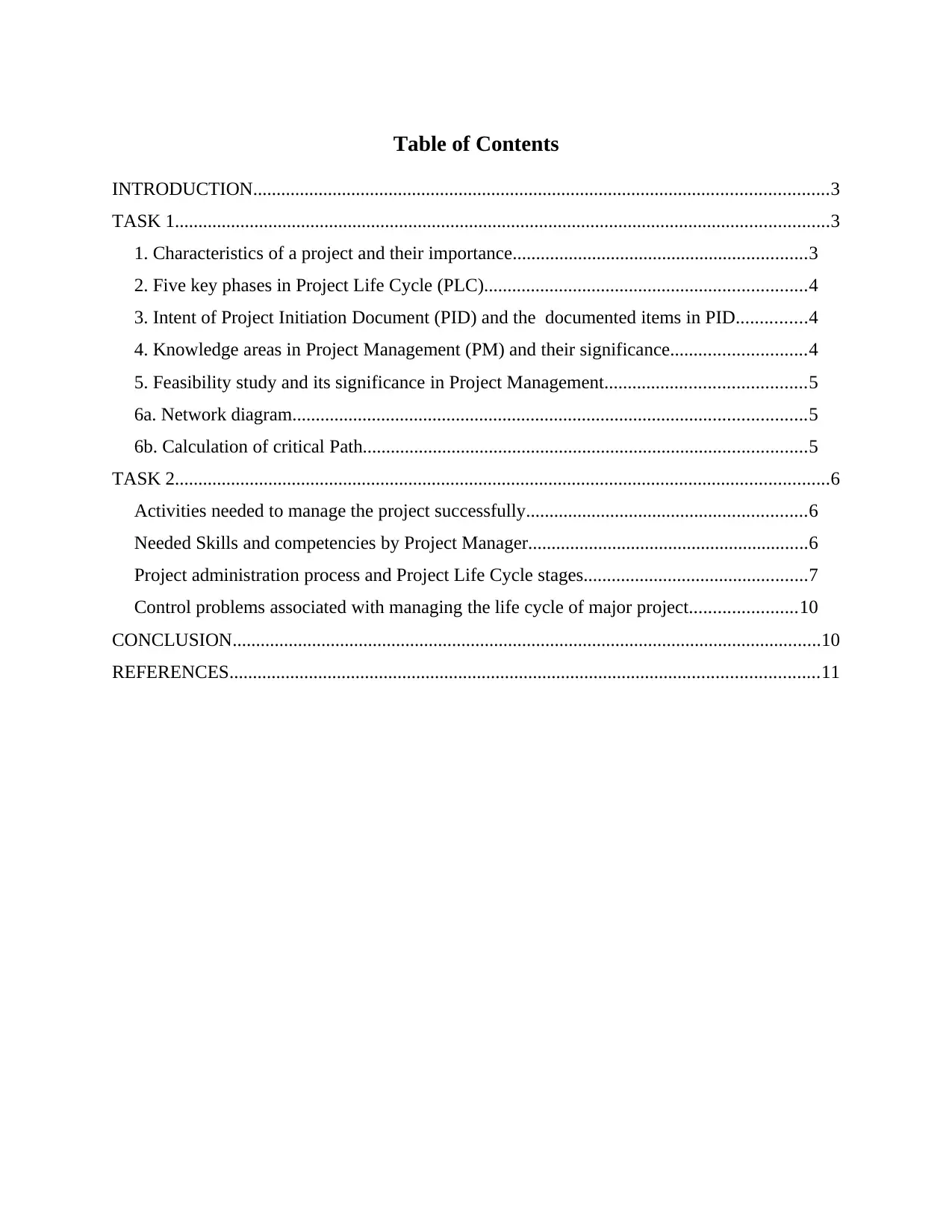
Table of Contents
INTRODUCTION...........................................................................................................................3
TASK 1............................................................................................................................................3
1. Characteristics of a project and their importance...............................................................3
2. Five key phases in Project Life Cycle (PLC).....................................................................4
3. Intent of Project Initiation Document (PID) and the documented items in PID...............4
4. Knowledge areas in Project Management (PM) and their significance.............................4
5. Feasibility study and its significance in Project Management...........................................5
6a. Network diagram..............................................................................................................5
6b. Calculation of critical Path...............................................................................................5
TASK 2............................................................................................................................................6
Activities needed to manage the project successfully............................................................6
Needed Skills and competencies by Project Manager............................................................6
Project administration process and Project Life Cycle stages................................................7
Control problems associated with managing the life cycle of major project.......................10
CONCLUSION..............................................................................................................................10
REFERENCES..............................................................................................................................11
INTRODUCTION...........................................................................................................................3
TASK 1............................................................................................................................................3
1. Characteristics of a project and their importance...............................................................3
2. Five key phases in Project Life Cycle (PLC).....................................................................4
3. Intent of Project Initiation Document (PID) and the documented items in PID...............4
4. Knowledge areas in Project Management (PM) and their significance.............................4
5. Feasibility study and its significance in Project Management...........................................5
6a. Network diagram..............................................................................................................5
6b. Calculation of critical Path...............................................................................................5
TASK 2............................................................................................................................................6
Activities needed to manage the project successfully............................................................6
Needed Skills and competencies by Project Manager............................................................6
Project administration process and Project Life Cycle stages................................................7
Control problems associated with managing the life cycle of major project.......................10
CONCLUSION..............................................................................................................................10
REFERENCES..............................................................................................................................11
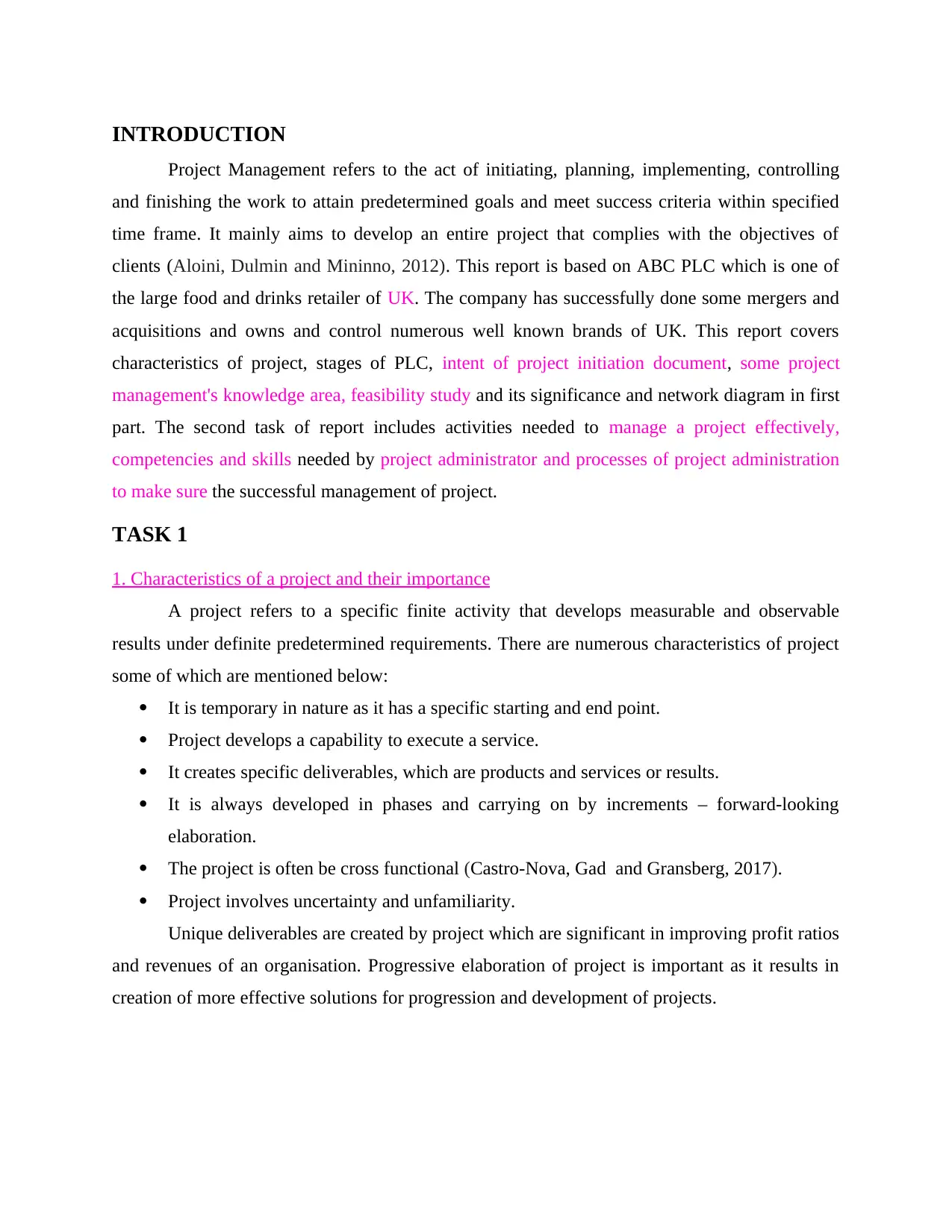
INTRODUCTION
Project Management refers to the act of initiating, planning, implementing, controlling
and finishing the work to attain predetermined goals and meet success criteria within specified
time frame. It mainly aims to develop an entire project that complies with the objectives of
clients (Aloini, Dulmin and Mininno, 2012). This report is based on ABC PLC which is one of
the large food and drinks retailer of UK. The company has successfully done some mergers and
acquisitions and owns and control numerous well known brands of UK. This report covers
characteristics of project, stages of PLC, intent of project initiation document, some project
management's knowledge area, feasibility study and its significance and network diagram in first
part. The second task of report includes activities needed to manage a project effectively,
competencies and skills needed by project administrator and processes of project administration
to make sure the successful management of project.
TASK 1
1. Characteristics of a project and their importance
A project refers to a specific finite activity that develops measurable and observable
results under definite predetermined requirements. There are numerous characteristics of project
some of which are mentioned below:
It is temporary in nature as it has a specific starting and end point.
Project develops a capability to execute a service.
It creates specific deliverables, which are products and services or results.
It is always developed in phases and carrying on by increments – forward-looking
elaboration.
The project is often be cross functional (Castro-Nova, Gad and Gransberg, 2017).
Project involves uncertainty and unfamiliarity.
Unique deliverables are created by project which are significant in improving profit ratios
and revenues of an organisation. Progressive elaboration of project is important as it results in
creation of more effective solutions for progression and development of projects.
Project Management refers to the act of initiating, planning, implementing, controlling
and finishing the work to attain predetermined goals and meet success criteria within specified
time frame. It mainly aims to develop an entire project that complies with the objectives of
clients (Aloini, Dulmin and Mininno, 2012). This report is based on ABC PLC which is one of
the large food and drinks retailer of UK. The company has successfully done some mergers and
acquisitions and owns and control numerous well known brands of UK. This report covers
characteristics of project, stages of PLC, intent of project initiation document, some project
management's knowledge area, feasibility study and its significance and network diagram in first
part. The second task of report includes activities needed to manage a project effectively,
competencies and skills needed by project administrator and processes of project administration
to make sure the successful management of project.
TASK 1
1. Characteristics of a project and their importance
A project refers to a specific finite activity that develops measurable and observable
results under definite predetermined requirements. There are numerous characteristics of project
some of which are mentioned below:
It is temporary in nature as it has a specific starting and end point.
Project develops a capability to execute a service.
It creates specific deliverables, which are products and services or results.
It is always developed in phases and carrying on by increments – forward-looking
elaboration.
The project is often be cross functional (Castro-Nova, Gad and Gransberg, 2017).
Project involves uncertainty and unfamiliarity.
Unique deliverables are created by project which are significant in improving profit ratios
and revenues of an organisation. Progressive elaboration of project is important as it results in
creation of more effective solutions for progression and development of projects.
⊘ This is a preview!⊘
Do you want full access?
Subscribe today to unlock all pages.

Trusted by 1+ million students worldwide
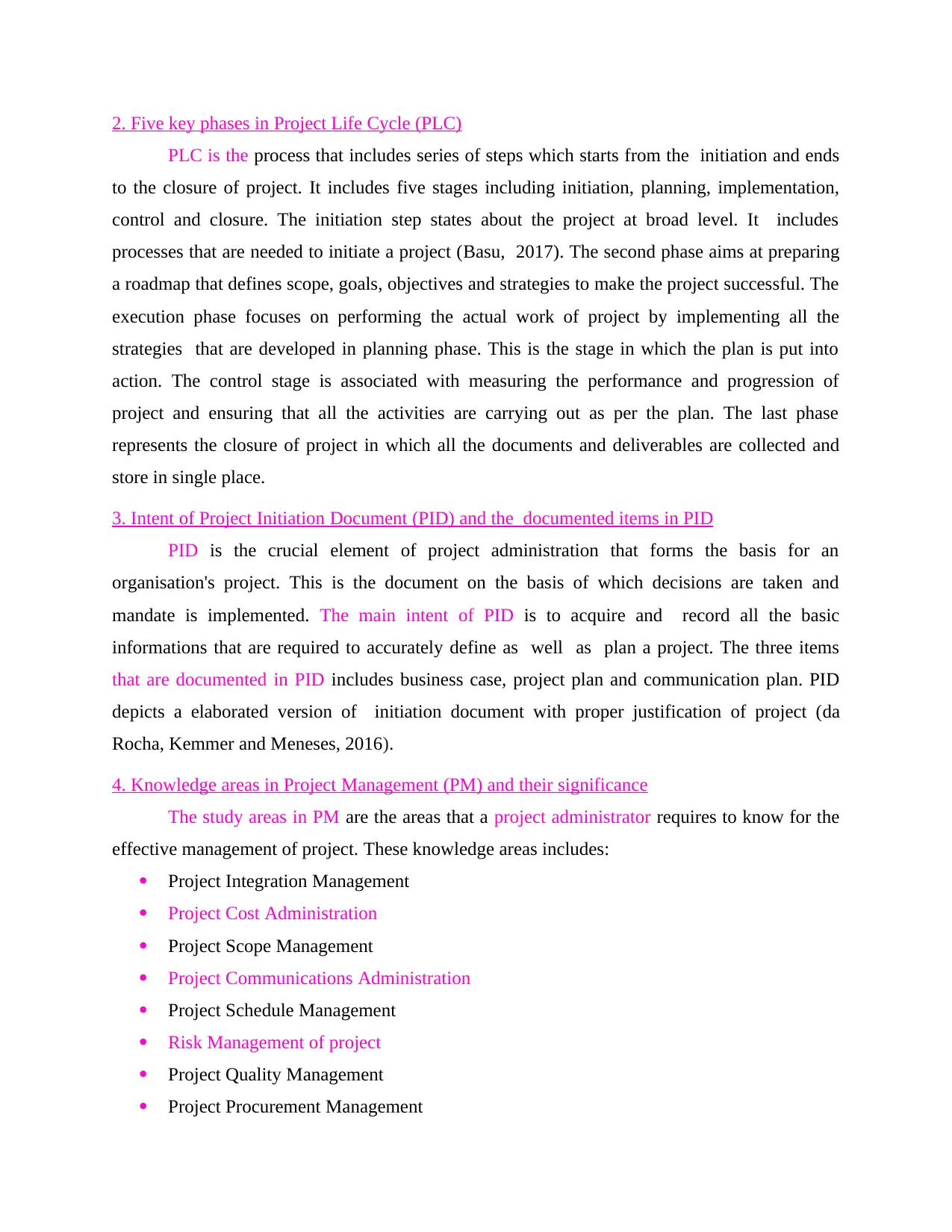
2. Five key phases in Project Life Cycle (PLC)
PLC is the process that includes series of steps which starts from the initiation and ends
to the closure of project. It includes five stages including initiation, planning, implementation,
control and closure. The initiation step states about the project at broad level. It includes
processes that are needed to initiate a project (Basu, 2017). The second phase aims at preparing
a roadmap that defines scope, goals, objectives and strategies to make the project successful. The
execution phase focuses on performing the actual work of project by implementing all the
strategies that are developed in planning phase. This is the stage in which the plan is put into
action. The control stage is associated with measuring the performance and progression of
project and ensuring that all the activities are carrying out as per the plan. The last phase
represents the closure of project in which all the documents and deliverables are collected and
store in single place.
3. Intent of Project Initiation Document (PID) and the documented items in PID
PID is the crucial element of project administration that forms the basis for an
organisation's project. This is the document on the basis of which decisions are taken and
mandate is implemented. The main intent of PID is to acquire and record all the basic
informations that are required to accurately define as well as plan a project. The three items
that are documented in PID includes business case, project plan and communication plan. PID
depicts a elaborated version of initiation document with proper justification of project (da
Rocha, Kemmer and Meneses, 2016).
4. Knowledge areas in Project Management (PM) and their significance
The study areas in PM are the areas that a project administrator requires to know for the
effective management of project. These knowledge areas includes:
Project Integration Management
Project Cost Administration
Project Scope Management
Project Communications Administration
Project Schedule Management
Risk Management of project
Project Quality Management
Project Procurement Management
PLC is the process that includes series of steps which starts from the initiation and ends
to the closure of project. It includes five stages including initiation, planning, implementation,
control and closure. The initiation step states about the project at broad level. It includes
processes that are needed to initiate a project (Basu, 2017). The second phase aims at preparing
a roadmap that defines scope, goals, objectives and strategies to make the project successful. The
execution phase focuses on performing the actual work of project by implementing all the
strategies that are developed in planning phase. This is the stage in which the plan is put into
action. The control stage is associated with measuring the performance and progression of
project and ensuring that all the activities are carrying out as per the plan. The last phase
represents the closure of project in which all the documents and deliverables are collected and
store in single place.
3. Intent of Project Initiation Document (PID) and the documented items in PID
PID is the crucial element of project administration that forms the basis for an
organisation's project. This is the document on the basis of which decisions are taken and
mandate is implemented. The main intent of PID is to acquire and record all the basic
informations that are required to accurately define as well as plan a project. The three items
that are documented in PID includes business case, project plan and communication plan. PID
depicts a elaborated version of initiation document with proper justification of project (da
Rocha, Kemmer and Meneses, 2016).
4. Knowledge areas in Project Management (PM) and their significance
The study areas in PM are the areas that a project administrator requires to know for the
effective management of project. These knowledge areas includes:
Project Integration Management
Project Cost Administration
Project Scope Management
Project Communications Administration
Project Schedule Management
Risk Management of project
Project Quality Management
Project Procurement Management
Paraphrase This Document
Need a fresh take? Get an instant paraphrase of this document with our AI Paraphraser
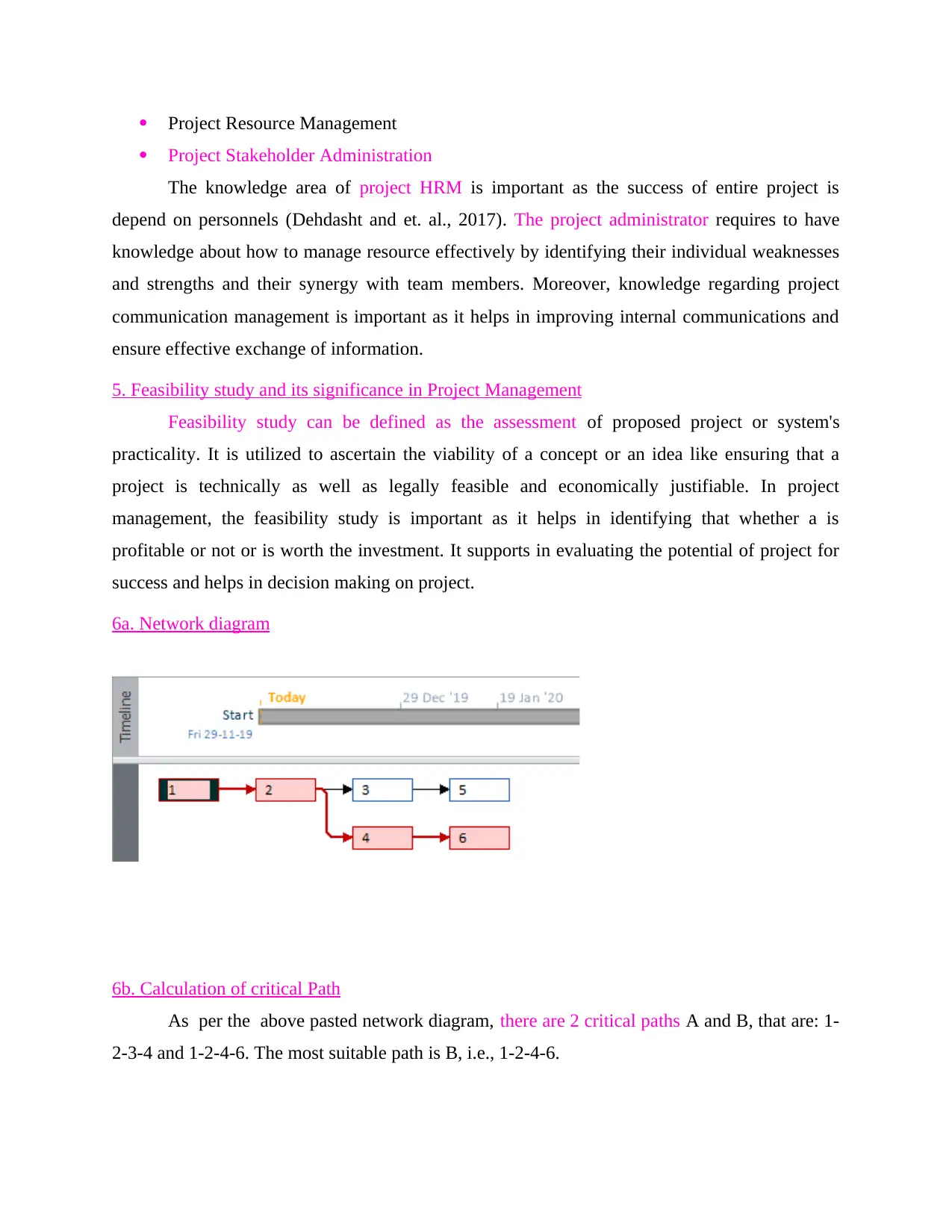
Project Resource Management
Project Stakeholder Administration
The knowledge area of project HRM is important as the success of entire project is
depend on personnels (Dehdasht and et. al., 2017). The project administrator requires to have
knowledge about how to manage resource effectively by identifying their individual weaknesses
and strengths and their synergy with team members. Moreover, knowledge regarding project
communication management is important as it helps in improving internal communications and
ensure effective exchange of information.
5. Feasibility study and its significance in Project Management
Feasibility study can be defined as the assessment of proposed project or system's
practicality. It is utilized to ascertain the viability of a concept or an idea like ensuring that a
project is technically as well as legally feasible and economically justifiable. In project
management, the feasibility study is important as it helps in identifying that whether a is
profitable or not or is worth the investment. It supports in evaluating the potential of project for
success and helps in decision making on project.
6a. Network diagram
6b. Calculation of critical Path
As per the above pasted network diagram, there are 2 critical paths A and B, that are: 1-
2-3-4 and 1-2-4-6. The most suitable path is B, i.e., 1-2-4-6.
Project Stakeholder Administration
The knowledge area of project HRM is important as the success of entire project is
depend on personnels (Dehdasht and et. al., 2017). The project administrator requires to have
knowledge about how to manage resource effectively by identifying their individual weaknesses
and strengths and their synergy with team members. Moreover, knowledge regarding project
communication management is important as it helps in improving internal communications and
ensure effective exchange of information.
5. Feasibility study and its significance in Project Management
Feasibility study can be defined as the assessment of proposed project or system's
practicality. It is utilized to ascertain the viability of a concept or an idea like ensuring that a
project is technically as well as legally feasible and economically justifiable. In project
management, the feasibility study is important as it helps in identifying that whether a is
profitable or not or is worth the investment. It supports in evaluating the potential of project for
success and helps in decision making on project.
6a. Network diagram
6b. Calculation of critical Path
As per the above pasted network diagram, there are 2 critical paths A and B, that are: 1-
2-3-4 and 1-2-4-6. The most suitable path is B, i.e., 1-2-4-6.
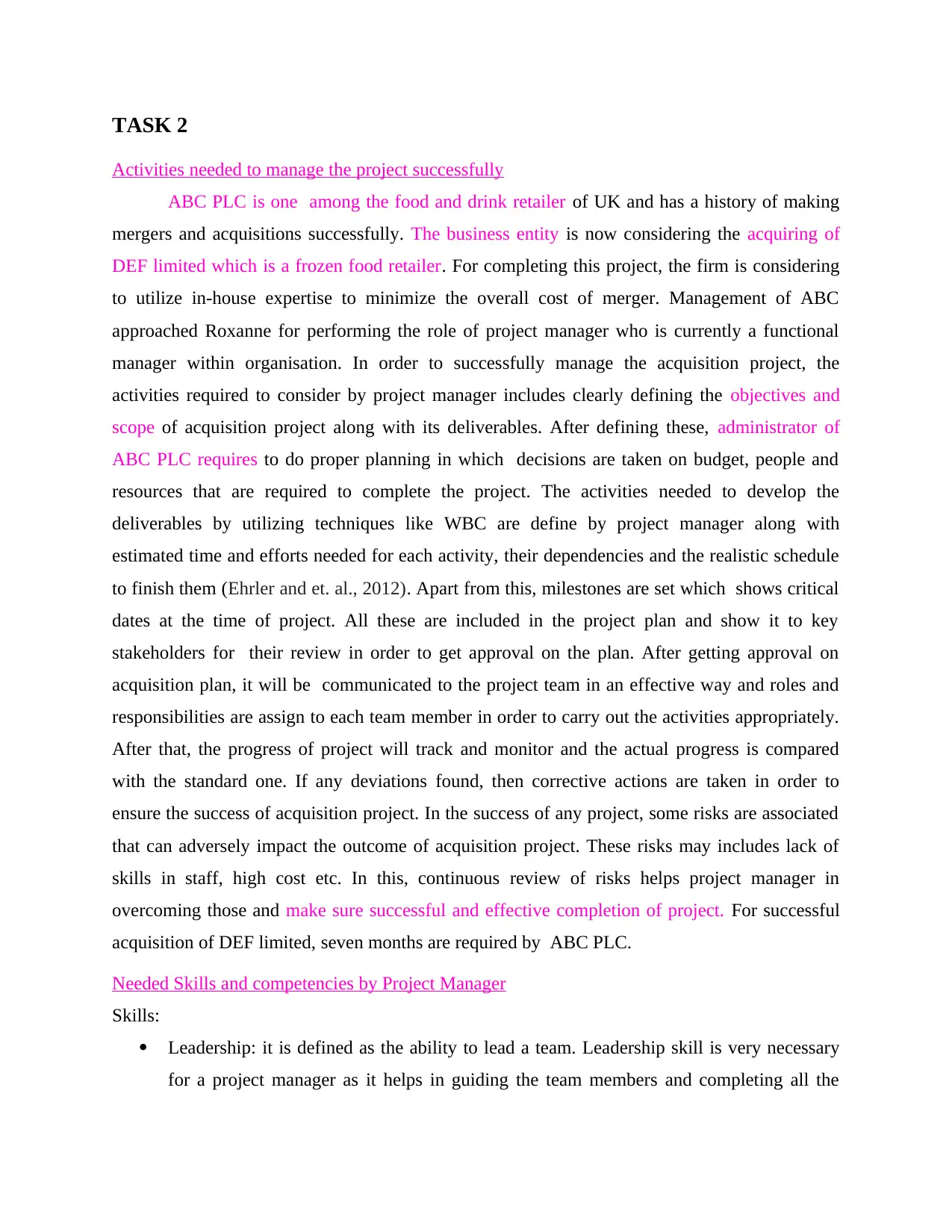
TASK 2
Activities needed to manage the project successfully
ABC PLC is one among the food and drink retailer of UK and has a history of making
mergers and acquisitions successfully. The business entity is now considering the acquiring of
DEF limited which is a frozen food retailer. For completing this project, the firm is considering
to utilize in-house expertise to minimize the overall cost of merger. Management of ABC
approached Roxanne for performing the role of project manager who is currently a functional
manager within organisation. In order to successfully manage the acquisition project, the
activities required to consider by project manager includes clearly defining the objectives and
scope of acquisition project along with its deliverables. After defining these, administrator of
ABC PLC requires to do proper planning in which decisions are taken on budget, people and
resources that are required to complete the project. The activities needed to develop the
deliverables by utilizing techniques like WBC are define by project manager along with
estimated time and efforts needed for each activity, their dependencies and the realistic schedule
to finish them (Ehrler and et. al., 2012). Apart from this, milestones are set which shows critical
dates at the time of project. All these are included in the project plan and show it to key
stakeholders for their review in order to get approval on the plan. After getting approval on
acquisition plan, it will be communicated to the project team in an effective way and roles and
responsibilities are assign to each team member in order to carry out the activities appropriately.
After that, the progress of project will track and monitor and the actual progress is compared
with the standard one. If any deviations found, then corrective actions are taken in order to
ensure the success of acquisition project. In the success of any project, some risks are associated
that can adversely impact the outcome of acquisition project. These risks may includes lack of
skills in staff, high cost etc. In this, continuous review of risks helps project manager in
overcoming those and make sure successful and effective completion of project. For successful
acquisition of DEF limited, seven months are required by ABC PLC.
Needed Skills and competencies by Project Manager
Skills:
Leadership: it is defined as the ability to lead a team. Leadership skill is very necessary
for a project manager as it helps in guiding the team members and completing all the
Activities needed to manage the project successfully
ABC PLC is one among the food and drink retailer of UK and has a history of making
mergers and acquisitions successfully. The business entity is now considering the acquiring of
DEF limited which is a frozen food retailer. For completing this project, the firm is considering
to utilize in-house expertise to minimize the overall cost of merger. Management of ABC
approached Roxanne for performing the role of project manager who is currently a functional
manager within organisation. In order to successfully manage the acquisition project, the
activities required to consider by project manager includes clearly defining the objectives and
scope of acquisition project along with its deliverables. After defining these, administrator of
ABC PLC requires to do proper planning in which decisions are taken on budget, people and
resources that are required to complete the project. The activities needed to develop the
deliverables by utilizing techniques like WBC are define by project manager along with
estimated time and efforts needed for each activity, their dependencies and the realistic schedule
to finish them (Ehrler and et. al., 2012). Apart from this, milestones are set which shows critical
dates at the time of project. All these are included in the project plan and show it to key
stakeholders for their review in order to get approval on the plan. After getting approval on
acquisition plan, it will be communicated to the project team in an effective way and roles and
responsibilities are assign to each team member in order to carry out the activities appropriately.
After that, the progress of project will track and monitor and the actual progress is compared
with the standard one. If any deviations found, then corrective actions are taken in order to
ensure the success of acquisition project. In the success of any project, some risks are associated
that can adversely impact the outcome of acquisition project. These risks may includes lack of
skills in staff, high cost etc. In this, continuous review of risks helps project manager in
overcoming those and make sure successful and effective completion of project. For successful
acquisition of DEF limited, seven months are required by ABC PLC.
Needed Skills and competencies by Project Manager
Skills:
Leadership: it is defined as the ability to lead a team. Leadership skill is very necessary
for a project manager as it helps in guiding the team members and completing all the
⊘ This is a preview!⊘
Do you want full access?
Subscribe today to unlock all pages.

Trusted by 1+ million students worldwide
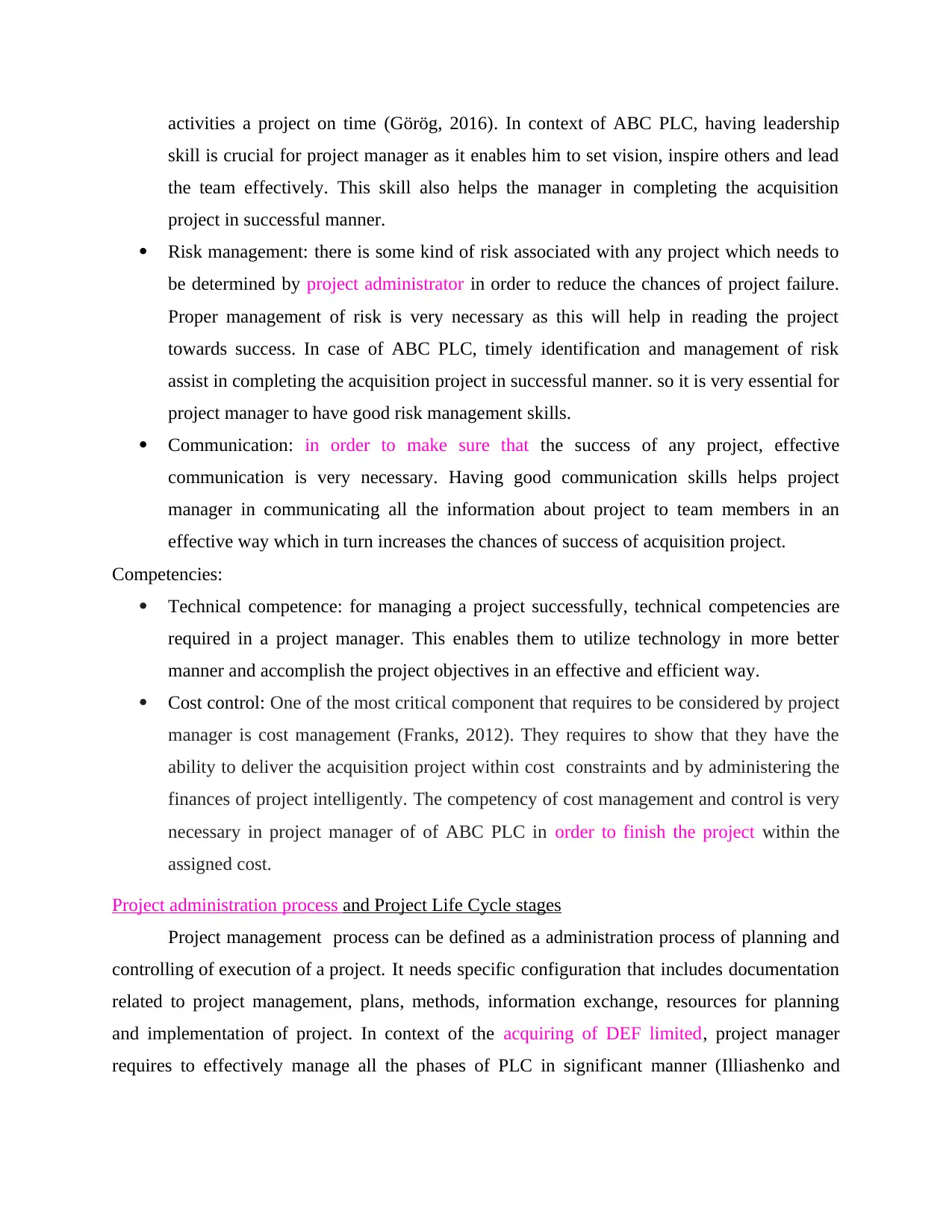
activities a project on time (Görög, 2016). In context of ABC PLC, having leadership
skill is crucial for project manager as it enables him to set vision, inspire others and lead
the team effectively. This skill also helps the manager in completing the acquisition
project in successful manner.
Risk management: there is some kind of risk associated with any project which needs to
be determined by project administrator in order to reduce the chances of project failure.
Proper management of risk is very necessary as this will help in reading the project
towards success. In case of ABC PLC, timely identification and management of risk
assist in completing the acquisition project in successful manner. so it is very essential for
project manager to have good risk management skills.
Communication: in order to make sure that the success of any project, effective
communication is very necessary. Having good communication skills helps project
manager in communicating all the information about project to team members in an
effective way which in turn increases the chances of success of acquisition project.
Competencies:
Technical competence: for managing a project successfully, technical competencies are
required in a project manager. This enables them to utilize technology in more better
manner and accomplish the project objectives in an effective and efficient way.
Cost control: One of the most critical component that requires to be considered by project
manager is cost management (Franks, 2012). They requires to show that they have the
ability to deliver the acquisition project within cost constraints and by administering the
finances of project intelligently. The competency of cost management and control is very
necessary in project manager of of ABC PLC in order to finish the project within the
assigned cost.
Project administration process and Project Life Cycle stages
Project management process can be defined as a administration process of planning and
controlling of execution of a project. It needs specific configuration that includes documentation
related to project management, plans, methods, information exchange, resources for planning
and implementation of project. In context of the acquiring of DEF limited, project manager
requires to effectively manage all the phases of PLC in significant manner (Illiashenko and
skill is crucial for project manager as it enables him to set vision, inspire others and lead
the team effectively. This skill also helps the manager in completing the acquisition
project in successful manner.
Risk management: there is some kind of risk associated with any project which needs to
be determined by project administrator in order to reduce the chances of project failure.
Proper management of risk is very necessary as this will help in reading the project
towards success. In case of ABC PLC, timely identification and management of risk
assist in completing the acquisition project in successful manner. so it is very essential for
project manager to have good risk management skills.
Communication: in order to make sure that the success of any project, effective
communication is very necessary. Having good communication skills helps project
manager in communicating all the information about project to team members in an
effective way which in turn increases the chances of success of acquisition project.
Competencies:
Technical competence: for managing a project successfully, technical competencies are
required in a project manager. This enables them to utilize technology in more better
manner and accomplish the project objectives in an effective and efficient way.
Cost control: One of the most critical component that requires to be considered by project
manager is cost management (Franks, 2012). They requires to show that they have the
ability to deliver the acquisition project within cost constraints and by administering the
finances of project intelligently. The competency of cost management and control is very
necessary in project manager of of ABC PLC in order to finish the project within the
assigned cost.
Project administration process and Project Life Cycle stages
Project management process can be defined as a administration process of planning and
controlling of execution of a project. It needs specific configuration that includes documentation
related to project management, plans, methods, information exchange, resources for planning
and implementation of project. In context of the acquiring of DEF limited, project manager
requires to effectively manage all the phases of PLC in significant manner (Illiashenko and
Paraphrase This Document
Need a fresh take? Get an instant paraphrase of this document with our AI Paraphraser
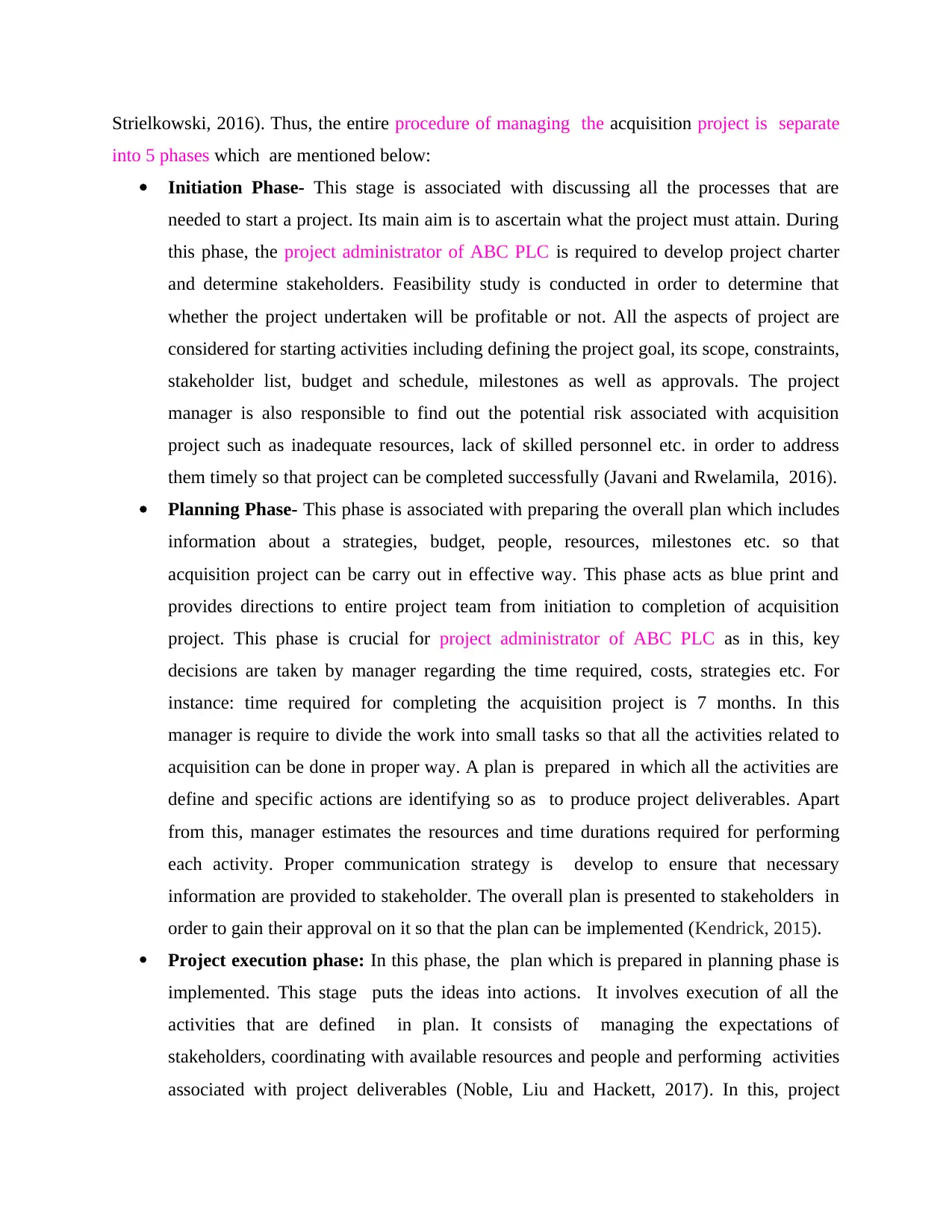
Strielkowski, 2016). Thus, the entire procedure of managing the acquisition project is separate
into 5 phases which are mentioned below:
Initiation Phase- This stage is associated with discussing all the processes that are
needed to start a project. Its main aim is to ascertain what the project must attain. During
this phase, the project administrator of ABC PLC is required to develop project charter
and determine stakeholders. Feasibility study is conducted in order to determine that
whether the project undertaken will be profitable or not. All the aspects of project are
considered for starting activities including defining the project goal, its scope, constraints,
stakeholder list, budget and schedule, milestones as well as approvals. The project
manager is also responsible to find out the potential risk associated with acquisition
project such as inadequate resources, lack of skilled personnel etc. in order to address
them timely so that project can be completed successfully (Javani and Rwelamila, 2016).
Planning Phase- This phase is associated with preparing the overall plan which includes
information about a strategies, budget, people, resources, milestones etc. so that
acquisition project can be carry out in effective way. This phase acts as blue print and
provides directions to entire project team from initiation to completion of acquisition
project. This phase is crucial for project administrator of ABC PLC as in this, key
decisions are taken by manager regarding the time required, costs, strategies etc. For
instance: time required for completing the acquisition project is 7 months. In this
manager is require to divide the work into small tasks so that all the activities related to
acquisition can be done in proper way. A plan is prepared in which all the activities are
define and specific actions are identifying so as to produce project deliverables. Apart
from this, manager estimates the resources and time durations required for performing
each activity. Proper communication strategy is develop to ensure that necessary
information are provided to stakeholder. The overall plan is presented to stakeholders in
order to gain their approval on it so that the plan can be implemented (Kendrick, 2015).
Project execution phase: In this phase, the plan which is prepared in planning phase is
implemented. This stage puts the ideas into actions. It involves execution of all the
activities that are defined in plan. It consists of managing the expectations of
stakeholders, coordinating with available resources and people and performing activities
associated with project deliverables (Noble, Liu and Hackett, 2017). In this, project
into 5 phases which are mentioned below:
Initiation Phase- This stage is associated with discussing all the processes that are
needed to start a project. Its main aim is to ascertain what the project must attain. During
this phase, the project administrator of ABC PLC is required to develop project charter
and determine stakeholders. Feasibility study is conducted in order to determine that
whether the project undertaken will be profitable or not. All the aspects of project are
considered for starting activities including defining the project goal, its scope, constraints,
stakeholder list, budget and schedule, milestones as well as approvals. The project
manager is also responsible to find out the potential risk associated with acquisition
project such as inadequate resources, lack of skilled personnel etc. in order to address
them timely so that project can be completed successfully (Javani and Rwelamila, 2016).
Planning Phase- This phase is associated with preparing the overall plan which includes
information about a strategies, budget, people, resources, milestones etc. so that
acquisition project can be carry out in effective way. This phase acts as blue print and
provides directions to entire project team from initiation to completion of acquisition
project. This phase is crucial for project administrator of ABC PLC as in this, key
decisions are taken by manager regarding the time required, costs, strategies etc. For
instance: time required for completing the acquisition project is 7 months. In this
manager is require to divide the work into small tasks so that all the activities related to
acquisition can be done in proper way. A plan is prepared in which all the activities are
define and specific actions are identifying so as to produce project deliverables. Apart
from this, manager estimates the resources and time durations required for performing
each activity. Proper communication strategy is develop to ensure that necessary
information are provided to stakeholder. The overall plan is presented to stakeholders in
order to gain their approval on it so that the plan can be implemented (Kendrick, 2015).
Project execution phase: In this phase, the plan which is prepared in planning phase is
implemented. This stage puts the ideas into actions. It involves execution of all the
activities that are defined in plan. It consists of managing the expectations of
stakeholders, coordinating with available resources and people and performing activities
associated with project deliverables (Noble, Liu and Hackett, 2017). In this, project
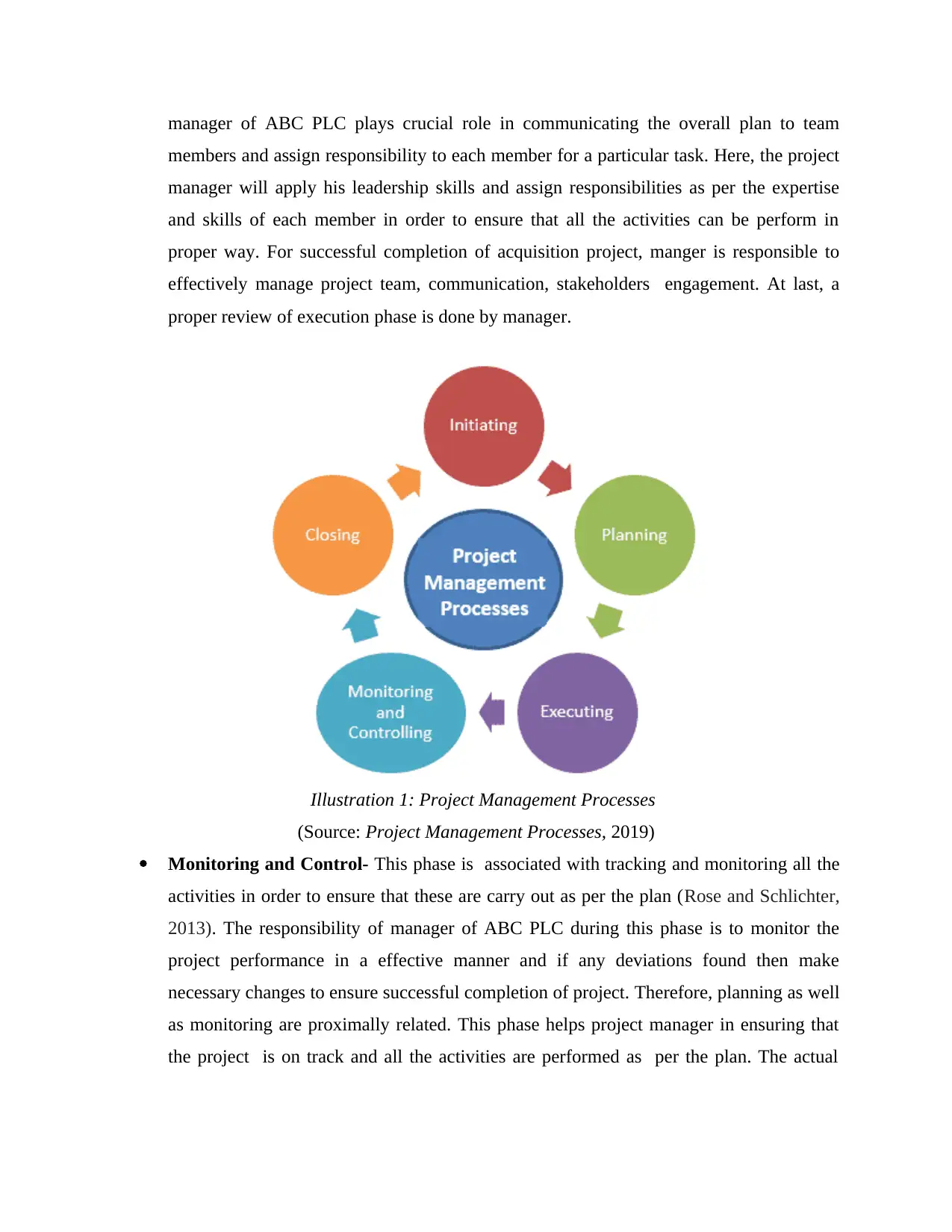
manager of ABC PLC plays crucial role in communicating the overall plan to team
members and assign responsibility to each member for a particular task. Here, the project
manager will apply his leadership skills and assign responsibilities as per the expertise
and skills of each member in order to ensure that all the activities can be perform in
proper way. For successful completion of acquisition project, manger is responsible to
effectively manage project team, communication, stakeholders engagement. At last, a
proper review of execution phase is done by manager.
(Source: Project Management Processes, 2019)
Monitoring and Control- This phase is associated with tracking and monitoring all the
activities in order to ensure that these are carry out as per the plan (Rose and Schlichter,
2013). The responsibility of manager of ABC PLC during this phase is to monitor the
project performance in a effective manner and if any deviations found then make
necessary changes to ensure successful completion of project. Therefore, planning as well
as monitoring are proximally related. This phase helps project manager in ensuring that
the project is on track and all the activities are performed as per the plan. The actual
Illustration 1: Project Management Processes
members and assign responsibility to each member for a particular task. Here, the project
manager will apply his leadership skills and assign responsibilities as per the expertise
and skills of each member in order to ensure that all the activities can be perform in
proper way. For successful completion of acquisition project, manger is responsible to
effectively manage project team, communication, stakeholders engagement. At last, a
proper review of execution phase is done by manager.
(Source: Project Management Processes, 2019)
Monitoring and Control- This phase is associated with tracking and monitoring all the
activities in order to ensure that these are carry out as per the plan (Rose and Schlichter,
2013). The responsibility of manager of ABC PLC during this phase is to monitor the
project performance in a effective manner and if any deviations found then make
necessary changes to ensure successful completion of project. Therefore, planning as well
as monitoring are proximally related. This phase helps project manager in ensuring that
the project is on track and all the activities are performed as per the plan. The actual
Illustration 1: Project Management Processes
⊘ This is a preview!⊘
Do you want full access?
Subscribe today to unlock all pages.

Trusted by 1+ million students worldwide
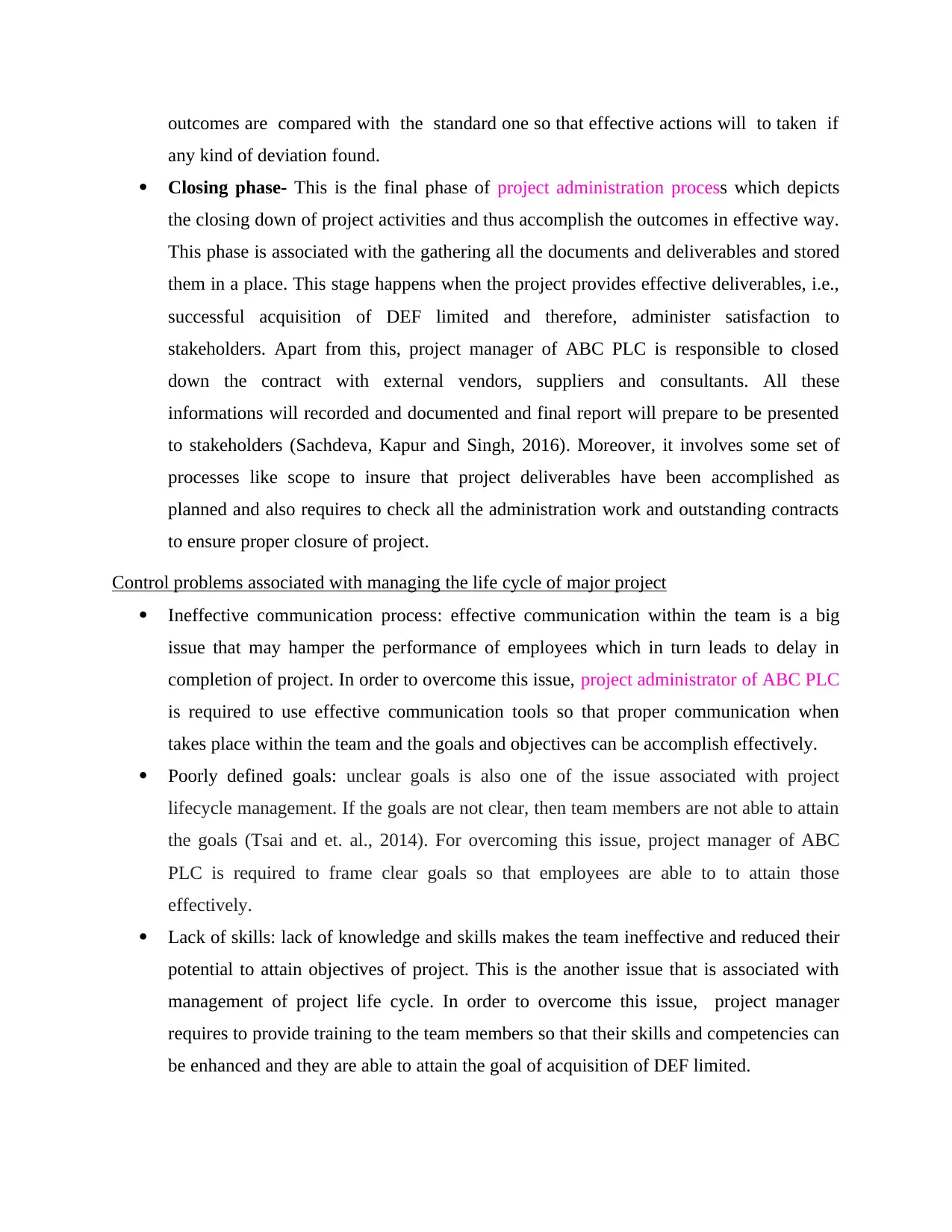
outcomes are compared with the standard one so that effective actions will to taken if
any kind of deviation found.
Closing phase- This is the final phase of project administration process which depicts
the closing down of project activities and thus accomplish the outcomes in effective way.
This phase is associated with the gathering all the documents and deliverables and stored
them in a place. This stage happens when the project provides effective deliverables, i.e.,
successful acquisition of DEF limited and therefore, administer satisfaction to
stakeholders. Apart from this, project manager of ABC PLC is responsible to closed
down the contract with external vendors, suppliers and consultants. All these
informations will recorded and documented and final report will prepare to be presented
to stakeholders (Sachdeva, Kapur and Singh, 2016). Moreover, it involves some set of
processes like scope to insure that project deliverables have been accomplished as
planned and also requires to check all the administration work and outstanding contracts
to ensure proper closure of project.
Control problems associated with managing the life cycle of major project
Ineffective communication process: effective communication within the team is a big
issue that may hamper the performance of employees which in turn leads to delay in
completion of project. In order to overcome this issue, project administrator of ABC PLC
is required to use effective communication tools so that proper communication when
takes place within the team and the goals and objectives can be accomplish effectively.
Poorly defined goals: unclear goals is also one of the issue associated with project
lifecycle management. If the goals are not clear, then team members are not able to attain
the goals (Tsai and et. al., 2014). For overcoming this issue, project manager of ABC
PLC is required to frame clear goals so that employees are able to to attain those
effectively.
Lack of skills: lack of knowledge and skills makes the team ineffective and reduced their
potential to attain objectives of project. This is the another issue that is associated with
management of project life cycle. In order to overcome this issue, project manager
requires to provide training to the team members so that their skills and competencies can
be enhanced and they are able to attain the goal of acquisition of DEF limited.
any kind of deviation found.
Closing phase- This is the final phase of project administration process which depicts
the closing down of project activities and thus accomplish the outcomes in effective way.
This phase is associated with the gathering all the documents and deliverables and stored
them in a place. This stage happens when the project provides effective deliverables, i.e.,
successful acquisition of DEF limited and therefore, administer satisfaction to
stakeholders. Apart from this, project manager of ABC PLC is responsible to closed
down the contract with external vendors, suppliers and consultants. All these
informations will recorded and documented and final report will prepare to be presented
to stakeholders (Sachdeva, Kapur and Singh, 2016). Moreover, it involves some set of
processes like scope to insure that project deliverables have been accomplished as
planned and also requires to check all the administration work and outstanding contracts
to ensure proper closure of project.
Control problems associated with managing the life cycle of major project
Ineffective communication process: effective communication within the team is a big
issue that may hamper the performance of employees which in turn leads to delay in
completion of project. In order to overcome this issue, project administrator of ABC PLC
is required to use effective communication tools so that proper communication when
takes place within the team and the goals and objectives can be accomplish effectively.
Poorly defined goals: unclear goals is also one of the issue associated with project
lifecycle management. If the goals are not clear, then team members are not able to attain
the goals (Tsai and et. al., 2014). For overcoming this issue, project manager of ABC
PLC is required to frame clear goals so that employees are able to to attain those
effectively.
Lack of skills: lack of knowledge and skills makes the team ineffective and reduced their
potential to attain objectives of project. This is the another issue that is associated with
management of project life cycle. In order to overcome this issue, project manager
requires to provide training to the team members so that their skills and competencies can
be enhanced and they are able to attain the goal of acquisition of DEF limited.
Paraphrase This Document
Need a fresh take? Get an instant paraphrase of this document with our AI Paraphraser
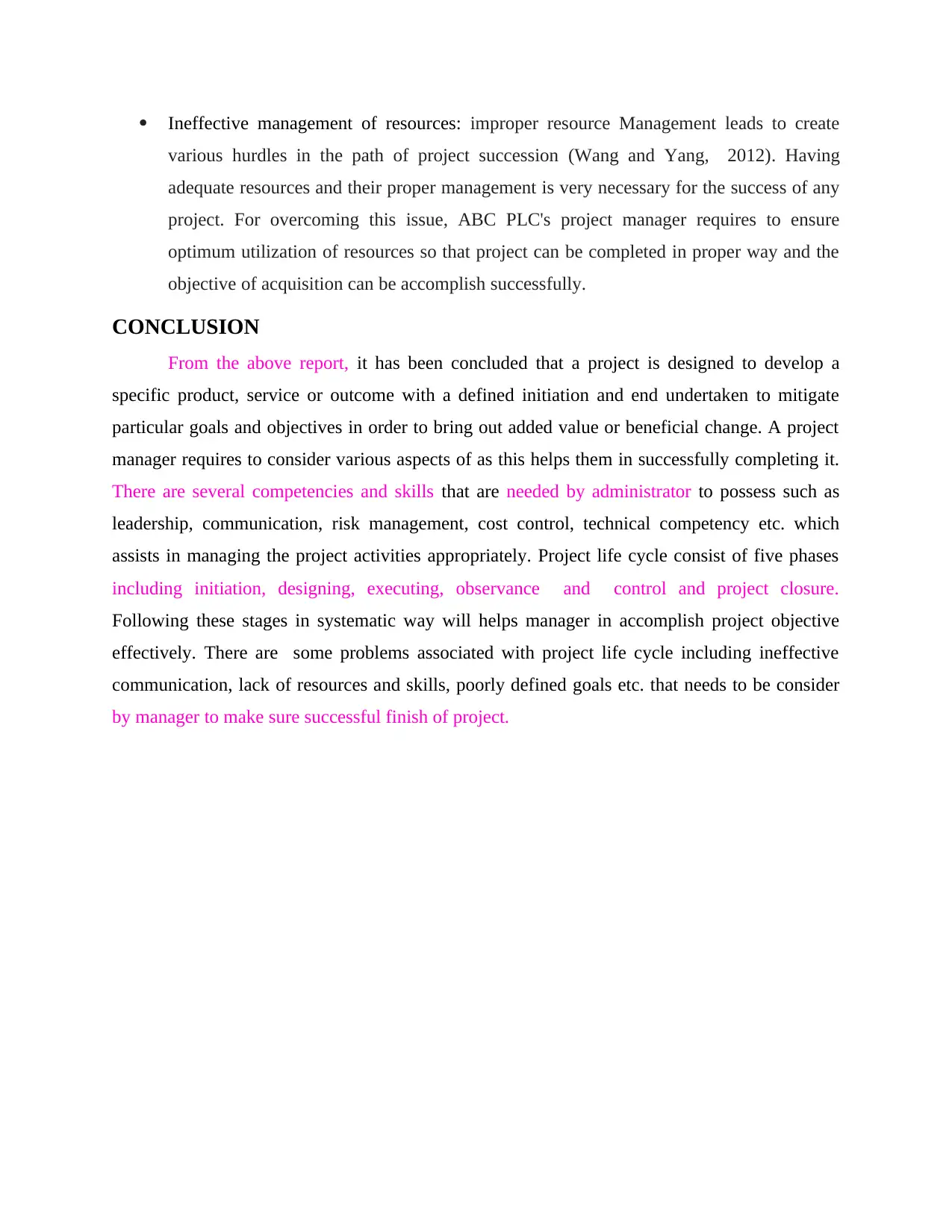
Ineffective management of resources: improper resource Management leads to create
various hurdles in the path of project succession (Wang and Yang, 2012). Having
adequate resources and their proper management is very necessary for the success of any
project. For overcoming this issue, ABC PLC's project manager requires to ensure
optimum utilization of resources so that project can be completed in proper way and the
objective of acquisition can be accomplish successfully.
CONCLUSION
From the above report, it has been concluded that a project is designed to develop a
specific product, service or outcome with a defined initiation and end undertaken to mitigate
particular goals and objectives in order to bring out added value or beneficial change. A project
manager requires to consider various aspects of as this helps them in successfully completing it.
There are several competencies and skills that are needed by administrator to possess such as
leadership, communication, risk management, cost control, technical competency etc. which
assists in managing the project activities appropriately. Project life cycle consist of five phases
including initiation, designing, executing, observance and control and project closure.
Following these stages in systematic way will helps manager in accomplish project objective
effectively. There are some problems associated with project life cycle including ineffective
communication, lack of resources and skills, poorly defined goals etc. that needs to be consider
by manager to make sure successful finish of project.
various hurdles in the path of project succession (Wang and Yang, 2012). Having
adequate resources and their proper management is very necessary for the success of any
project. For overcoming this issue, ABC PLC's project manager requires to ensure
optimum utilization of resources so that project can be completed in proper way and the
objective of acquisition can be accomplish successfully.
CONCLUSION
From the above report, it has been concluded that a project is designed to develop a
specific product, service or outcome with a defined initiation and end undertaken to mitigate
particular goals and objectives in order to bring out added value or beneficial change. A project
manager requires to consider various aspects of as this helps them in successfully completing it.
There are several competencies and skills that are needed by administrator to possess such as
leadership, communication, risk management, cost control, technical competency etc. which
assists in managing the project activities appropriately. Project life cycle consist of five phases
including initiation, designing, executing, observance and control and project closure.
Following these stages in systematic way will helps manager in accomplish project objective
effectively. There are some problems associated with project life cycle including ineffective
communication, lack of resources and skills, poorly defined goals etc. that needs to be consider
by manager to make sure successful finish of project.
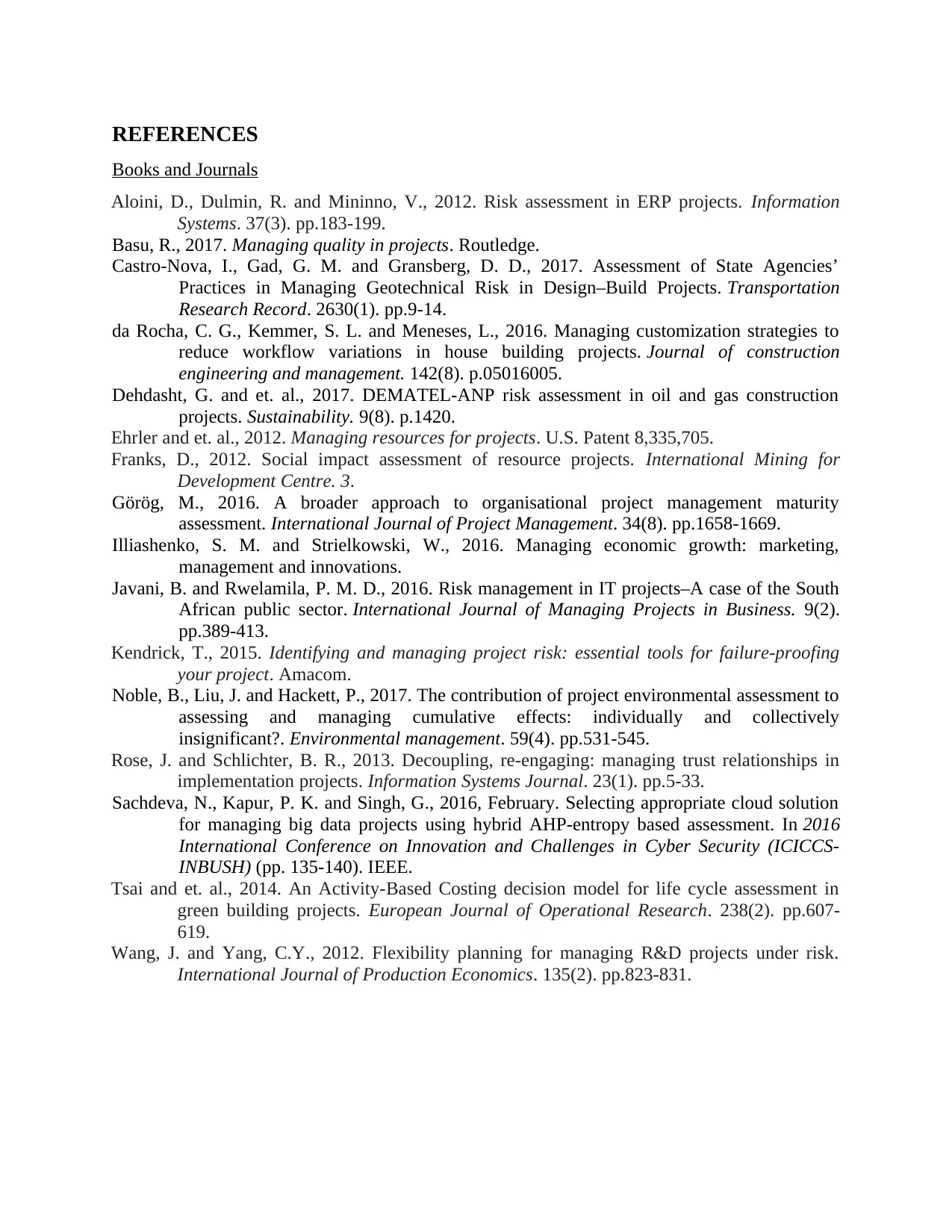
REFERENCES
Books and Journals
Aloini, D., Dulmin, R. and Mininno, V., 2012. Risk assessment in ERP projects. Information
Systems. 37(3). pp.183-199.
Basu, R., 2017. Managing quality in projects. Routledge.
Castro-Nova, I., Gad, G. M. and Gransberg, D. D., 2017. Assessment of State Agencies’
Practices in Managing Geotechnical Risk in Design–Build Projects. Transportation
Research Record. 2630(1). pp.9-14.
da Rocha, C. G., Kemmer, S. L. and Meneses, L., 2016. Managing customization strategies to
reduce workflow variations in house building projects. Journal of construction
engineering and management. 142(8). p.05016005.
Dehdasht, G. and et. al., 2017. DEMATEL-ANP risk assessment in oil and gas construction
projects. Sustainability. 9(8). p.1420.
Ehrler and et. al., 2012. Managing resources for projects. U.S. Patent 8,335,705.
Franks, D., 2012. Social impact assessment of resource projects. International Mining for
Development Centre. 3.
Görög, M., 2016. A broader approach to organisational project management maturity
assessment. International Journal of Project Management. 34(8). pp.1658-1669.
Illiashenko, S. M. and Strielkowski, W., 2016. Managing economic growth: marketing,
management and innovations.
Javani, B. and Rwelamila, P. M. D., 2016. Risk management in IT projects–A case of the South
African public sector. International Journal of Managing Projects in Business. 9(2).
pp.389-413.
Kendrick, T., 2015. Identifying and managing project risk: essential tools for failure-proofing
your project. Amacom.
Noble, B., Liu, J. and Hackett, P., 2017. The contribution of project environmental assessment to
assessing and managing cumulative effects: individually and collectively
insignificant?. Environmental management. 59(4). pp.531-545.
Rose, J. and Schlichter, B. R., 2013. Decoupling, re‐engaging: managing trust relationships in
implementation projects. Information Systems Journal. 23(1). pp.5-33.
Sachdeva, N., Kapur, P. K. and Singh, G., 2016, February. Selecting appropriate cloud solution
for managing big data projects using hybrid AHP-entropy based assessment. In 2016
International Conference on Innovation and Challenges in Cyber Security (ICICCS-
INBUSH) (pp. 135-140). IEEE.
Tsai and et. al., 2014. An Activity-Based Costing decision model for life cycle assessment in
green building projects. European Journal of Operational Research. 238(2). pp.607-
619.
Wang, J. and Yang, C.Y., 2012. Flexibility planning for managing R&D projects under risk.
International Journal of Production Economics. 135(2). pp.823-831.
Books and Journals
Aloini, D., Dulmin, R. and Mininno, V., 2012. Risk assessment in ERP projects. Information
Systems. 37(3). pp.183-199.
Basu, R., 2017. Managing quality in projects. Routledge.
Castro-Nova, I., Gad, G. M. and Gransberg, D. D., 2017. Assessment of State Agencies’
Practices in Managing Geotechnical Risk in Design–Build Projects. Transportation
Research Record. 2630(1). pp.9-14.
da Rocha, C. G., Kemmer, S. L. and Meneses, L., 2016. Managing customization strategies to
reduce workflow variations in house building projects. Journal of construction
engineering and management. 142(8). p.05016005.
Dehdasht, G. and et. al., 2017. DEMATEL-ANP risk assessment in oil and gas construction
projects. Sustainability. 9(8). p.1420.
Ehrler and et. al., 2012. Managing resources for projects. U.S. Patent 8,335,705.
Franks, D., 2012. Social impact assessment of resource projects. International Mining for
Development Centre. 3.
Görög, M., 2016. A broader approach to organisational project management maturity
assessment. International Journal of Project Management. 34(8). pp.1658-1669.
Illiashenko, S. M. and Strielkowski, W., 2016. Managing economic growth: marketing,
management and innovations.
Javani, B. and Rwelamila, P. M. D., 2016. Risk management in IT projects–A case of the South
African public sector. International Journal of Managing Projects in Business. 9(2).
pp.389-413.
Kendrick, T., 2015. Identifying and managing project risk: essential tools for failure-proofing
your project. Amacom.
Noble, B., Liu, J. and Hackett, P., 2017. The contribution of project environmental assessment to
assessing and managing cumulative effects: individually and collectively
insignificant?. Environmental management. 59(4). pp.531-545.
Rose, J. and Schlichter, B. R., 2013. Decoupling, re‐engaging: managing trust relationships in
implementation projects. Information Systems Journal. 23(1). pp.5-33.
Sachdeva, N., Kapur, P. K. and Singh, G., 2016, February. Selecting appropriate cloud solution
for managing big data projects using hybrid AHP-entropy based assessment. In 2016
International Conference on Innovation and Challenges in Cyber Security (ICICCS-
INBUSH) (pp. 135-140). IEEE.
Tsai and et. al., 2014. An Activity-Based Costing decision model for life cycle assessment in
green building projects. European Journal of Operational Research. 238(2). pp.607-
619.
Wang, J. and Yang, C.Y., 2012. Flexibility planning for managing R&D projects under risk.
International Journal of Production Economics. 135(2). pp.823-831.
⊘ This is a preview!⊘
Do you want full access?
Subscribe today to unlock all pages.

Trusted by 1+ million students worldwide
1 out of 12
Related Documents
Your All-in-One AI-Powered Toolkit for Academic Success.
+13062052269
info@desklib.com
Available 24*7 on WhatsApp / Email
![[object Object]](/_next/static/media/star-bottom.7253800d.svg)
Unlock your academic potential
© 2024 | Zucol Services PVT LTD | All rights reserved.





